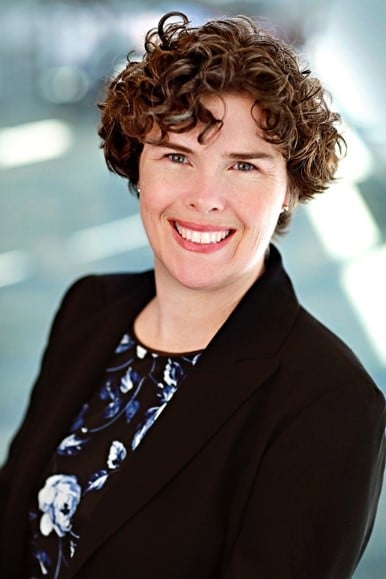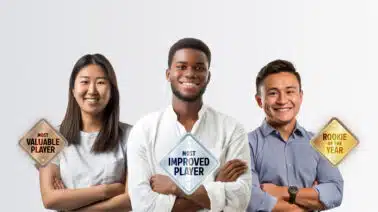20 years of hard-earned experience managing the logistics of military relocations led to a programming career helping other military families move more easily!
While it’s not necessarily thought of as a conventional “career,” 20 years of organizing regular house moves for her military family (including four children!) has been a LOT of work for Kimberly McCaffrey. She has managed a constant cycle of organizing movers, schools, housing, and logistics, in whatever location the Navy sent them next. When her husband decided to retire, Kimberly knew everything was about to change, and so she started on an exciting new journey—embracing her childhood fascination with computers and launching a career as a programmer. Along the way she won a hackathon, and is now building a new app focused on a subject she knows very well—helping military families relocate!
We were lucky enough to chat with Kimberly to hear about her experiences learning to program, and what she plans to do next.
Have you always been interested in programming?
My dad was a computer programmer. He knew about computers from back in the 1960s, when computers took up whole rooms. I remember our first computer at home was “portable,” but it probably weighed 50 pounds! The screen was green and six inches across. But we were thankful to have it, and we were the only people in the street to have one.
I remember as a child, my dad would send away for kits to build early computer components. He’d read the instructions. I’d hand him the pieces. Occasionally he let me do the soldering. So I remember a lot of the nitty gritty—of actually soldering a circuit board. It was really cool.
It sounds like computers were a big part of your early life. Why didn’t you decide to start exploring the industry earlier?
Well, I think because I also remember that my dad always had a beeper. He would always be on call, so we’d be in the middle of a family function and he’d suddenly have to head off for a two hour drive to Boston to fix the servers. So I always saw working with computers as both a really important, stable career, as well as something that had downsides I thought I didn’t want to deal with.
You ended up choosing to study Biology at college, and then worked for a pharmaceutical company in the quality control microbiology lab. Then, after you married, your life took a different direction entirely, didn’t it?
My husband is in the US Navy, so I took over managing our family’s moves when his job would relocate us elsewhere. It was really my thing, and became a full-time occupation for me—there has been a constant cycle for the last 20 years, of cleaning up after one move, getting settled, catching our breath for a short period, then the build up to the next big move. I’d always be planning ahead, and we have four kids, so that is a lot of planning! I’d have to find out what schools there were. Check out the housing options. Understand the differences in living costs. All of that.
What prompted you to look at doing something new in your career?
My husband is due to retire next year. It’s an exciting time for us, and everything is going to change. I’ve been loving what I do, but it’s coming to an end. I started to want to try to scale up, shift gears, and think about what I do next. At college, I was in the biology department and then did microbiology in a lab, working on quality control. I wondered if I could go back to that.
What happened when you explored career paths in the areas you had past experience in?
These more traditional paths just didn’t pan out. Either the pay was laughable, or the hours were laughable, or the expectations were unrealistic. I got really frustrated. I had all this experience from organizing house moves, and I felt really capable, but I didn’t know what the answer to what I should do was.
I decided to push myself in all directions, and looked at every option I could think of. Eventually, that childhood interest in computers caught up with me. I heard of one company that had free online computer courses for military families, so I signed up for a few of those. They sounded exciting in theory, but the programs themselves were so out of date. So I stopped working on those and looked at other online options to learn coding. That’s when I found Udacity.
Then I saw an ad for the Grow with Google scholarships for Udacity programs. I’d already started taking some of Udacity’s free CSS and HTML programs, so it really caught my attention. I thought I didn’t have anything to lose, and I should put myself out there and try, so I applied.
And after you applied, you got some good news, didn’t you?
I got in! And oh my word, I was just so excited to be accepted. It was a really big deal when I got my acceptance letter.
That’s wonderful! What did you think of the program, once you got started?
It was great! I was really motivated to push myself to do well, and to keep going. And there just was the best sense of community on the program to help me. It was fantastic. It really helped that participation in the forums were really encouraged—it got us all talking. I met a lot of people that way, and it helped me to keep pushing myself.
While you were still in the program, you actually got involved in a very interesting programming event. Can you tell us about that?
Yes, I heard about a hackathon happening in Washington DC. I’d started going to a few local meetups about programming in my area, and the opportunity was mentioned. It sounded really cool, one thing led to another, and I found myself entering it with a fellow military spouse!
It was a military event—VetHacks. We just wanted to try, so threw our hats in the ring. We didn’t expect anything. We just wanted to show up and put in our best effort.
I’m excited to ask, how did you do?
“We won! And we were the only women competing! It was awesome. We had a plan for an app, we did a storyboard, then I jumped into the front-end. We programmed the whole weekend, from dawn to dusk.”
I held my own on the front-end, using all the skills I’d already built in my Nanodegree program. And my partner did amazing things working on the back-end. We were a great team. I’d have an idea, she’d have an idea.
We both won the opportunity to go to another military event—Patriot Bootcamp in Denver—for a full weekend of learning, mentors, and networking. It was an amazing experience!
And I understand that you’ve actually maintained that momentum and continued to build websites as a team—now as a commercial enterprise. Is that right?
Over the summer, we actually built a business as co-founders, working on a portfolio of a few projects. One is My Move Binder, which is our civilian app to help people plan house moves. Then our lead product is a digital version of a Permanent Change of Station (PCS) binder for military families. It’s the idea we first built at the hackathon. Traditionally, when you move in the military, all your information goes into a three-ring binder. That seemed so old school to us, so we’re making an app that you can access from anywhere, with all your information updated on the fly.
What does your family think of your new focus on building websites?
My husband is really proud of me. And the kids have all been really behind me. They’ve totally understood that mom was trying something new, that learning to code is what she’s doing now. So they did laundry. They would make lunch. It was very heartwarming to know they stood behind me, and that they understood how important it was to me.
–
It’s so great to hear that your success in learning a completely new skill set has come with the backing of your entire family! And it’s wonderful to see that you’ve taken 20 years of hard-earned experience managing the logistics of military relocations and applied it to an exciting new initiative to help other military families move more easily! We wish you the best of luck with your new venture, and we can’t wait to hear more about where you take your coding career next!





